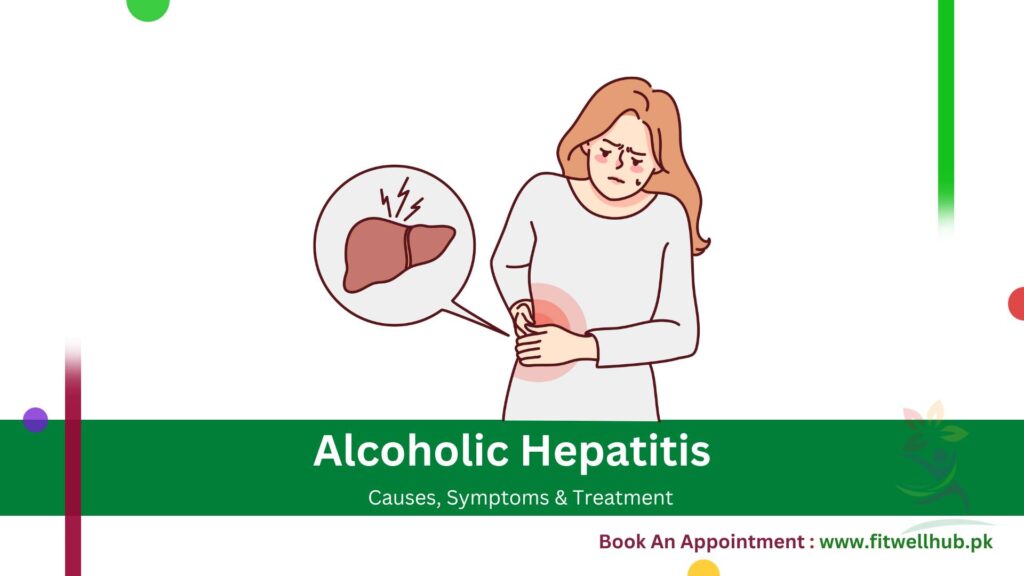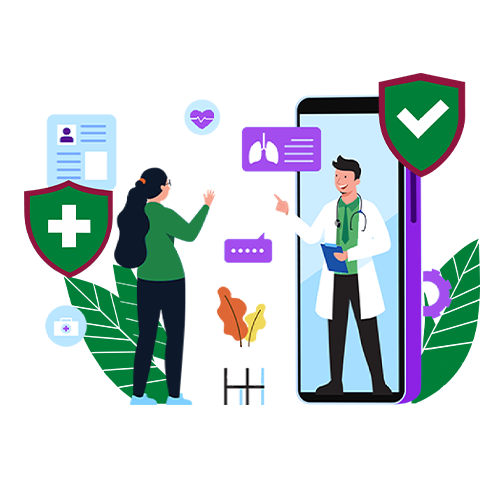Alcoholic hepatitis is an inflammation of the liver caused by excessive and prolonged use of alcohol. It ranges from mild to severe and can cause life-threatening complications. Mostly it occurs when the liver cells get damaged due to the toxic effects of alcohol, causing inflammation and reduced liver function.
Quick Links
ToggleAlcoholic hepatitis does more serious damage to the liver than other fatty liver diseases, which can often be reversed by avoiding alcohol. Common symptoms of Alcoholic Hepatitis include fatigue, abdominal pain, and jaundice. If left untreated, alcoholic hepatitis can lead to severe complications such as liver cirrhosis or liver failure, both of which carry a high risk of death. Identifying the causes, seeking early diagnosis, and adhering to a strict treatment plan, including complete alcohol cessation, are crucial for managing and potentially reversing the condition.
Symptoms of Alcoholic hepatitis
Alcoholic hepatitis has a variety of symptoms, ranging from mild anxiety to severe life-threatening conditions. These symptoms have significant effects on the quality of life and may worsen if excessive alcohol consumption continues for a long time. Some common symptoms of alcoholic hepatitis are discussed below:
- Jaundice: Jaundice is the most common symptom of alcoholic hepatitis. Generally, it occurs when the liver cannot process bilirubin, resulting in its accumulation in the blood. Due to this skin and eyes colour turn yellow.
- Abdominal Pain and Tenderness: The liver is present in the upper right quadrant of the abdomen. Due to alcoholic hepatitis, it becomes swollen and enlarged. It can cause a lot of pain and tenderness in the liver.
- Nausea and Vomiting: The body struggles to process toxins, and inflammation of the liver can cause persistent nausea and vomiting.
- Fatigue and Weakness: Due to reduced liver function, the body may not properly metabolize nutrients or detoxify the blood. It causes weakness and fatigue.
- Loss of Appetite and Weight Loss: Alcoholic hepatitis patients usually experience a loss of appetite, which can cause sudden weight loss over time.
- Fever: In certain cases, patients may also suffer from fever because the liver inflammation triggers an immune response.
- Confusion or Altered Mental State (in Severe Cases): In more severe cases, liver dysfunction may lead to confusion, disorientation, or even coma due to the accumulation of toxins in the bloodstream.
When to See a Doctor
If you are facing symptoms of alcoholic hepatitis like jaundice, severe abdominal pain, or continuous nausea and vomiting, it is essential to go for a medical checkup immediately. Early diagnosis and prompt treatment prevent the progression of alcoholic hepatitis to more severe conditions like cirrhosis or liver failure.
If you have a heavy drinking habit and are facing any of the symptoms described above you need to consult with your doctor. They will evaluate your liver function and will provide you with guidance on managing the condition effectively. At Fitwell Hub, our team of doctors specializes in treating liver conditions, including alcoholic hepatitis.
Causes
Alcoholic hepatitis is mainly caused by excessive alcohol consumption, which can cause inflammation and damage to liver cells. The condition generally develops after years of excessive drinking, but everyone who drinks excessively doesn’t need to develop alcoholic hepatitis.
A few common causes of alcoholic hepatitis are discussed below:
- Persistent Alcohol Addiction: Continuous use of excessive amounts of alcohol for a long time is the major cause of alcoholic hepatitis. Though the liver metabolizes alcohol, excessive amounts of alcohol will disrupt the liver’s capacity to metabolize it and will cause inflammation of the liver.
- Binge Drinking: Binge drinking or consumption of large amounts of alcohol in a short period causes sudden and severe liver inflammation. Sometimes it even occurs in individuals who do not drink regularly.
- Genetic Susceptibility: Some individuals are more susceptible to developing alcoholic hepatitis because their genetic factors have an impact on the liver’s ability to process alcohol.
- Accompanying Liver Diseases: Underlying liver conditions such as hepatitis C or fatty liver disease can also worsen the effects of alcohol and increase the risk of developing alcoholic hepatitis.
- Malnutrition: High alcohol consumption usually causes poor nutrition. It weakens the liver’s ability to repair itself and makes it more susceptible to inflammation and damage.
Risk Factors
Various factors increase the risk of developing alcoholic hepatitis. Knowing these risk factors helps prevent the beginning of the disease.
- Amount and Duration of Alcohol Consumption: Your risk of developing alcoholic hepatitis increases with the amount and duration of alcohol you drink.
- Gender: Because women’s livers digest alcohol differently than men’s, therefore women are more vulnerable to alcohol-related liver injury.
- Obesity: Obesity causes the risk of alcoholic hepatitis and worsens liver inflammation.
- Genetics: Certain individuals may be more susceptible to the hepatic effects of alcohol due to genetic reasons.
- Previous Liver Diseases: Alcoholic hepatitis is more common in people who already have liver diseases, such as hepatitis C.
Complications
If not treated promptly alcoholic hepatitis can cause severe and life-threatening complications. Some of the major complications are discussed below:
| Condition | Description |
|---|---|
| Cirrhosis | Persistent inflammation from alcoholic hepatitis can cause cirrhosis, where healthy liver tissue is replaced with scar tissue, leading to permanent liver damage. |
| Liver Failure | In severe cases, liver function deteriorates completely, often requiring a liver transplant. |
| Hepatic Encephalopathy | Toxins normally cleared by the liver accumulate in the blood, affecting the brain and causing confusion, memory loss, and potentially coma. |
| Kidney Failure | Alcoholic hepatitis may impair kidney function, leading to kidney failure and complicating the patient’s condition further. |
| Portal Hypertension | Increased blood pressure in the portal vein causes vein swelling and internal bleeding. |
| Ascites | Fluid buildup in the abdomen, resulting in discomfort and difficulty breathing. |
| Sepsis | A severe, body-wide infection that occurs as the immune system weakens due to liver disease. |
Prevention
Prevention of alcoholic hepatitis mainly requires moderate alcohol consumption and controlling other risk factors. Some key preventive measures are discussed below:
- Limit Alcohol Intake: Moderation is key; therefore avoid excessive drinking to decrease the risk of liver inflammation.
- Maintain a Healthy Weight: Obesity increases the risk of developing liver disease, so maintaining a healthy weight is crucial.
- Regular Health Check-ups: Regular liver function tests are used to identify early signs of liver damage.
- Healthy Diet: A balanced diet rich in nutrients is necessary to support liver health and prevent liver-related complications.
- Avoid Mixing Alcohol with Medications: Certain medications can increase the harmful effects of alcohol on the liver. Therefore, it is important to avoid combining them without consulting a doctor.
- Stay Hydrated: The use of excessive water helps the liver to process alcohol and other toxins effectively reducing the stress on the liver.
At Fitwell Hub we offer a Healthy Elite Lifestyle Program designed to help you adopt healthier habits and prevent liver diseases.
Diagnosis
For the Diagnosis of alcoholic hepatitis, a combination of medical history, physical examination, and diagnostic tests are used. Your doctor will first review your alcohol consumption history and then will evaluate your symptoms.
1- Blood Tests
Blood tests are used for the evaluation of liver function and to identify signs of liver inflammation. They measure liver enzymes, bilirubin levels, and other signs to evaluate the performance of the liver and to identify any damage caused by alcohol.
2- Imaging Tests
Imaging techniques like ultrasound, CT scans, or MRIs are used to visually assess the liver. These tests are used to detect inflammation, structural changes, and other abnormalities in the liver that may cause alcoholic hepatitis or other liver diseases.
3- Liver Biopsy
In liver biopsy, a small tissue sample is taken from the liver to examine it under a microscope. This test is used for the confirmation of diagnosis and to evaluate the severity of liver damage.
4- Additional Tests
Other tests are used to evaluate nutritional deficiencies or check for other liver conditions like hepatitis C. At Fitwell Hub we offer a wide range of diagnostic services, including liver function tests, to help in the early detection of liver diseases. To learn more, visit our Fitwell Hub Labs.
Treatment Of Alcoholic Hepatitis
Treatment plans focus on the management of symptoms of alcoholic hepatitis, preventing complications, and avoiding further liver damage.
- Complete Abstinence from Alcohol: The most crucial step in the treatment of alcoholic hepatitis is stopping alcohol consumption completely.
- Nutritional Support: Patients are generally required to follow a high-calorie, high-protein diet to resist malnutrition.
- Medications: Corticosteroids or other anti-inflammatory drugs are used to reduce liver inflammation.
- Liver Transplant: In severe cases where the liver is damaged irreversibly, a liver transplant is only the option left for the treatment of Alcoholic hepatitis.
- Management of Complications: Treatments of Alcoholic hepatitis also include medications to manage complications like hepatic encephalopathy, ascites, and portal hypertension.
- Psychosocial Support: Support groups and counseling are helpful for the patients to cope with the psychological aspects of alcohol addiction and recovery.
Medications
Medications play a vital role in managing alcoholic hepatitis and preventing further liver damage.
1- Corticosteroids
Corticosteroids are commonly prescribed to decrease liver inflammation in patients with alcoholic hepatitis. By decreasing inflammation, these medications can improve liver function and increase the chances of recovery, particularly in severe cases.
2- Pentoxifylline
Pentoxifylline is sometimes used to decrease the risk of complications such as hepatorenal syndrome, a severe condition in which kidney function is disturbed rapidly in patients with severe liver disease. Pentoxifylline will improve blood flow and reduce inflammation.
3- Vitamin Supplements
Due to malnutrition generally linked with alcoholic hepatitis, patients require vitamin supplements, especially vitamins A, D, E, and K, as well as B-complex vitamins. These supplements compensate for nutritional deficiencies and support overall health during recovery.
At Fitwell Hub’s pharmacy, we provide these medications and offer guidance on their proper use. To learn more, visit our FitwellHub Pharmacy.
Frequently Asked Questions (FAQ’s)
Alcoholic hepatitis is further divided into three stages. These are alcoholic hepatitis (inflammation), fatty liver (steatosis), and cirrhosis (scarring). Each stage shows increasing liver damage due to alcohol consumption.
Excessive alcohol consumption causes alcoholic hepatitis. It is a form of liver inflammation.
It is not sexually transmitted, rather it is caused by long-term excessive use of alcohol.
It can be improved by avoiding excessive alcohol consumption. However severe cases can cause irreversible liver damage or death. Proper treatment of Alcoholic hepatitis is essential for managing symptoms and complications.














